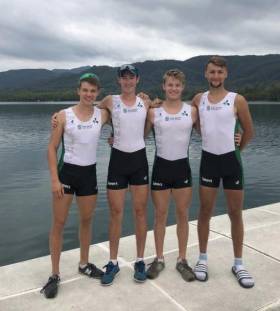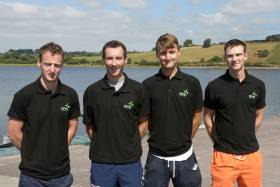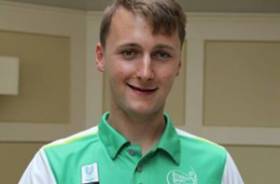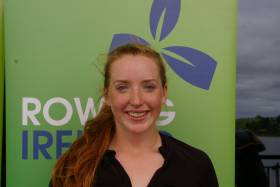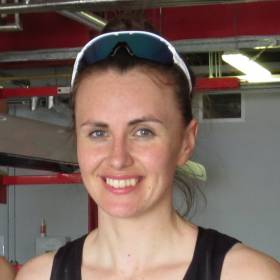Displaying items by tag: Goff
Ireland Lightweight Quadruple Take Third in Heat at World Rowing
#Rowing: Ireland finished third in their heat of the lightweight quadruple sculls this morning at the World Rowing Championships in Plovdiv, Bulgaria. Italy took the one direct qualification place for the Final. The men in blue harnessed the good conditions and built a lead through the race. They had a clearwater advantage by the final quarter. In a battle for second place, the Czech Republic pipped the Ireland crew of Fintan McCarthy, Ryan Ballantine, Jake McCarthy and Andrew Goff.
World Rowing Championships, Plovdiv, Bulgaria, Day Two (Irish interest)
Men
Lightweight Quadruple Sculls – Heat Two (First to A Final; rest to Repechage): 1 Italy 5:48.03; 3 Ireland (F McCarthy, R Ballantine, J McCarthy, A Goff) 5:53.43.
#Rowing: Ireland’s lightweight quadruple scull of Miles Taylor, Niall Beggan, Ryan Ballantine and Andrew Goff won their repechage and moved into the A Final at the World Under-23 Championships in Poznan, Poland.
The Ireland crew would have gone through with first or second and they disputed the lead with Spain until half way. But Ireland hit that line first and went on to lead. Germany tried hard to push into the top two, but Spain rebuffed them, while Ireland had a one-length lead from Spain at the finish. Britain finished fourth.
Hugh Sutton also came through in his repechage. The 19-year-old raced well to take second and qualify for the quarter-finals of the lightweight single sculls. Four from six qualified. Early on, Egypt’s Omar Amer, who had made a false start, fell to the back of the race and stayed there throughout, while Turkey’s Enes Yenipazarli shot into a lead he would never lose. Sutton stayed in second for most of the race, swapping it with American Zachary Heese, but then beating him in a sprint in the closing stages.
The Ireland men’s and women’s lightweight double sculls had earlier made it directly through their heats.
World Under-23 Championships, Poznan, Poland (Irish interest; selected results)
Men
Lightweight Quadruple Sculls – Repechage (First Two to A Final; rest to B Final): 1 Ireland (M Taylor, N Beggan, R Ballantine, A Goff) 6:01.47, 2 Spain 6:04.02.
Lightweight Double Sculls – Heat Three (First to A/B Semi-Finals; rest to Repechage): 1 Ireland (F McCarthy, J McCarthy) 6:35.94.
Lightweight Single Sculls – Repechage (Top Four to Quarter-Finals; rest to E Final): 2 Ireland (H Sutton) 7:21.51
Women
Lightweight Double Sculls – Heat Four (First Two to A/B Semi-Finals; rest to Repechage): 2 Ireland (L Heaphy, M Cremen) 7:37.99.
Goff Misses Out on a Medal at European Under-23 Champs
#Rowing: Ireland’s Andrew Goff finished fifth at the European Under-23 Rowing Championships in Poland today. Jan Cincibuch of the Czech Republic won gold. He finished ahead of Austria, Slovenia and Turkey, who battled it out for the other medals, with Turkey’s Enes Yenipazarli missing out, though he had shown real guts to take on Cincibuch. Goff was not able to bridge the gap to this leading group.
The Ireland women’s eight are set to compete in their A Final in Kruszwica at 1.45 Irish time.
European Under-23 Championships, Kruszwica, Poland, Day Two (Irish interest)
Men
Lightweight Single Sculls – A/B Semi-Final Two (First Three to A Final; rest to B Final): 1 Czech Republic 7:34.58, 2 Ireland (A Goff) 7:37.64, 3 Sweden 7:42.26.
Semi One: 1 Austria 7:32.69, 2 Turkey 7:34.45, 3 Slovenia 7:40.16. A Final: 1 Czech Republic 7:44.38, 2 Austria 7:46.64, 3 Slovenia 7:48.58; 5 Ireland (A Goff) 7:58.72.
Goff Fights Through Headwind to Qualify for European Under-23 Semi-Final
#Rowing: Ireland’s Adrew Goff has qualified for the A/B semi-finals at the European Under-23 Rowing Championships. The UCD man finished third in his heat this morning in Kruszwica in Poland. Goff started well but, in difficult, headwind, conditions, he yielded the lead to Jan Cincibuch of the Czech Republic, who won well. Goff and Enes Yenipazarli of Turkey, who finished second, then firmly established themselves in the next two qualification places. This was by far the fastest of the heats, with all three qualifiers inside the winning time in heats one and three.
The weather has been extraordinary at the venue: the opening ceremony had to be cancelled because of torrential rain and the temperatures dropped from 30 degrees on Thursday to half that on Friday.
European Under-23 Rowing Championships, Kruszwica, Poland (Irish interest) – Day One
Men
Lightweight Single Sculls – Heat Two (First Three to A/B Semi-Final; rest to Repechage): 3 Ireland (A Goff) 8:21.00.
Two Ireland Crews Compete at European Under-23 Rowing
#Rowing: Ireland will compete at the European Rowing Under-23 Championships this weekend. A team of athletes, along with coaches and management, departed for Kruszwica, Poland, earlier this week for the event which takes place on Saturday and Sunday, the 2nd and 3rd of September.
The Ireland women’s eight will be the first crew of this category to compete for the country at a FISA World Rowing event.
UCD’s Andrew Goff, who was part of the Ireland lightweight quadruple which took bronze at the World Rowing Under-23 Championships last month, will compete in the lightweight men’s single sculls. Goff was due to team up in a lightweight men’s double sculls with Niall Beggan, who has been forced to withdraw from racing due to illness.
The women’s eight crew will be made up from seven clubs from Cork, Galway and Dublin. The athletes selected are Emily Hegarty (Skibbereen RC), Sadhbh O’Connor (NUIG BC), Oisin Forde (Cork BC), Aoife Corcoran (DULBC), Caoimhe Dempsey (DULBC), Claire Feerick (Neptune RC), Nuala Landers (NUIG BC), Ruth Gilligan (UCD BC). UCC’s Cormac O’Connell will cox the crew. Coaches John Armstrong and Paul Thornton have travelled to Poland. Denis O’Regan is the team manager.
Kruszwica is a town in central Poland, situated at Lake Goplo. The Kruszwica regatta course is a natural rowing course.
The event includes over 150 entries. Heats and repechages take place on Saturday, followed by semi-finals and finals on Sunday. The draw will be made tomorrow (Friday) afternoon.
Commercial and UCD Double Test O'Donovans at Cork Regatta
#Rowing: Niall Beggan and Andrew Goff gave Gary and Paul O’Donovan a good battle in the Division One double sculls at Cork Regatta today. The Ireland under-23 lightweights, drawn from UCD and Commercial, placed second behind the Ireland senior lightweight double, ahead of Shane O’Driscoll and Mark O’Donovan.
NUIG won the men’s fours and the Skibbereen/UCC composite the women’s four by convincing margins. Cork won the women’s double, while Lee’s juniors took second.
Cork Regatta, National Rowing Centre, Cork, Day Two (Selected Results)
Men
Four – Div One – A Final: 1 NUIG (sen) 6:16.41. Four, coxed – Div Two – A Final: 1 Queen’s B (club two) 6:53.69, 2 St Michael’s (jun 18B) 6:56.53; 6 Presentation, Cork (jun 16) 7:33.61.
Sculling, Double – A Final: 1 Skibbereen (G O’Donovan, P O’Donovan; sen) 6:25.51, 2 Commercial, UCD (N Beggan, A Goff; sen) 6:27.62, 3 Skibbereen (M O’Donovan, S O’Driscoll; sen) 6:37.997; 5 Three Castles A (jun 18A) 6:49.76. B Final: St Michael’s (inter) 6:51.20.
Single – Div Two – A Final: 1 Three Castles (A Keogh; jun 16) 7:29.64, 2 Cappoquin (S Landers; club two) 7:35.39; 6 Killorglin (J McCarthy; Jun 18B) 7:52.86.
Women
Four – Div One – A Final: 1 Skibbereen, UCC (N Casey, E Hegarty, A Keogh, D Walsh; sen) 6:59.0. B Final: Col Iognaid (jun 18A) 7:39.68.
Sculling, Double – Div One – A Final: 1 Cork (inter) 7:19.591, 2 Lee (jun 18A) 7:23.45. B Final: 2 Carlow (club one) 7:40.31.
Ireland Junior Quadruple Are Afloat Rowers of the Month For August
#Rowers of the Month: The Afloat Rowers of the Month for August are the Ireland junior quadruple scull which won two gold medals at the Coupe de la Jeunesse in Szeged in Hungary. In early September, the senior team would make their mark at the World Championships, but in August it was the juniors which came away with a five-medal haul. The junior women’s double of Aoife Casey and Emily Hegarty took silver on Saturday and Sunday and single sculler Dervla Forde took bronze on the Sunday. But the most successful crew was the junior men’s quadruple of Colm Hennessy, Eoghan Whittle, Patrick Munnelly and Andrew Goff. They had also taken gold at the 2014 Coupe.
Rower of the Month awards: The judging panel is made up of Liam Gorman, rowing correspondent of The Irish Times and David O'Brien, Editor of Afloat magazine. Monthly awards for achievements during the year will appear on afloat.ie and the overall national award will be presented to the person or crew who, in the judges' opinion, achieved the most notable results in, or made the most significant contribution to rowing during 2015. Keep a monthly eye on progress and watch our 2015 champions list grow.


























